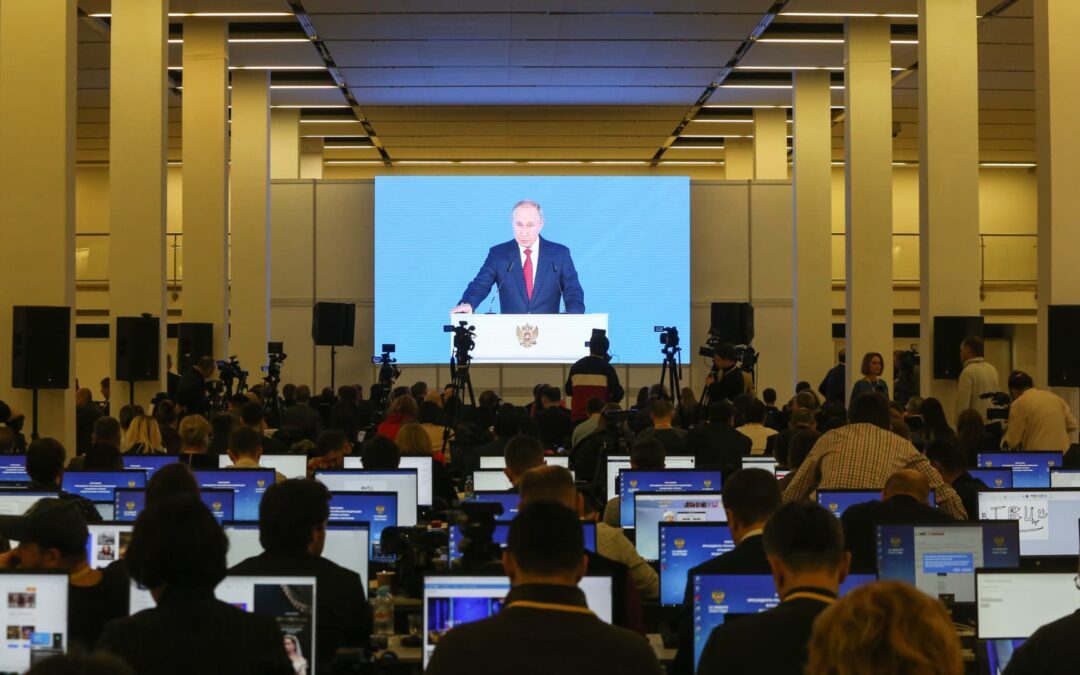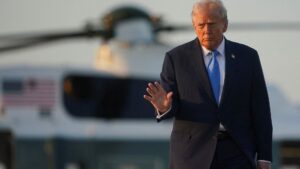Putin prepares to deliver State of the Nation address
Russian President Vladimir Putin delivers his annual address to the Federal Assembly, on April 21, 2021 in Moscow, Russia.
Konstantin Zavrazhin | Getty Images News | Getty Images
Russian President Vladimir Putin is set to deliver his State of the Nation address to Russian lawmakers Thursday.
The speech is usually delivered to around a 1,000 lawmakers and officials, faith leaders, diplomats and journalists. As was the case last year, participants in Russia’s “special military operation” (code for war) in Ukraine have also been invited. The speech begins at noon local time (9 a.m. GMT).
The topics of the address are not usually revealed ahead of the speech, but Putin said last week that the upcoming message takes into account “the internal political calendar” and will set Russia’s goals for the next six years. The longest address took place in 2018 and lasted almost two hours.
There’s speculation that Putin could use his State of the Nation address on Thursday to make some announcement about Transnistria, potentially even bolstering Russia’s small military presence in the separatist region.
Putin’s speech comes less than a month before the presidential election on March 15-17 that Putin is expected to win given the lack of non-systemic opposition figures in Russia and pro-Kremlin media.
Russian news agencies will be broadcasting the speech online and it will be broadcast on federal TV channels as well as outdoor screens in large cities. Streets are closed off in central Moscow for the event.
— Holly Ellyatt
What will Putin do after breakaway region asked Moscow to ‘protect’ it?
Vladimir Putin, Russia’s president, as he speaks during his annual state of the nation address in Moscow, Russia, on Wednesday, Jan. 15, 2020.
Bloomberg
Russian President Vladimir Putin’s next move is being closely watched after the pro-Russian, breakaway region of Transnistria in Moldova asked Russia to “protect” it against an alleged threat from Moldova’s authorities.
Russia’s Foreign Ministry responded by saying protecting that the interests of the residents of Transnistria — calling them “compatriots” — was a priority for Russia, the ministry told RIA Novosti.
There’s speculation that Putin could use his State of the Nation address on Thursday to make some announcement about Transnistria, potentially even bolstering Russia’s small military presence in the separatist region.
Read more on the story here: West watches for Putin’s next move after breakaway region asks Moscow to ‘protect’ it from Moldova
Russia could use a tactic it has used previously to justify similar actions — that is, saying it is acting to protect its own citizens by sending troops into the region. The same tactic has been used in eastern Ukraine with pro-Russian separatists in Donetsk and Luhansk, and in the case of the Russian-backed separatist regions of South Ossetia and Abkhazia in Georgia. Both of those cases led to, or involved, war.
Moldova’s pro-Western government slammed what it saw as a “propaganda” statement from Transnistria while the U.S. said it was watching events closely.
“One signpost to watch this year is whether Putin makes any references to Transnistria, an internationally recognized part of Moldova which has been controlled by Russia since 1992,” Andrius Tursa, central and eastern Europe advisor at risk consultancy Teneo, said in a note this week.
— Holly Ellyatt
Russia says it may take ‘retaliatory measures’ as Sweden joins NATO
Russia on Wednesday said it regrets that Sweden is set to join NATO and pledged to take some retaliatory measures to protect itself.
“Russia will take retaliatory measures of a political and military-technical nature in order to stop threats to its national security. Their specific content will depend on the conditions and scale of Sweden’s integration into NATO, including the possible deployment of NATO troops, strike systems and weapons on the territory of this country,” the Russian Foreign Ministry said in a post via Telegram, according to a Google translation.
Russia said that while security matters are a sovereign question for Sweden, the move would have a negative impact on northern Europe’s stability and the Baltic Sea region, which is shared by Sweden, Russia and various other countries.
Sweden bid to join NATO, where an attack one member country is seen as an attack on all members, following Russia’s full-scale invasion of Ukraine in 2022. After long-standing opposition, Hungary on Monday voted to approve the bid, clearing the way for Sweden to join the alliance.
— Sophie Kiderlin
Leaders should consider using frozen Russian assets to bolster Ukraine’s military, EU’s von der Leyen says
European leaders should discuss using the profits from frozen Russian assets to boost Ukraine’s military, European Commission President Ursula von der Leyen said Wednesday.
“It is time to start a conversation about using the windfall profits of frozen Russian assets to jointly purchase military equipment for Ukraine,” she said in a speech before the European Parliament.
“There could be no stronger symbol and no greater use for that money than to make Ukraine and all of Europe a safer place to live,” von der Leyen noted.
Von der Leyen’s comments come after U.S. Treasury Secretary Janet Yellen on Tuesday said it is important to find a way to unlock the value of frozen assets to bolster Ukraine, stressing there is a “strong international law, economic and moral case” to do so, and that it was crucial for allies to work together on the matter.
Read the full story here.
— Sophie Kiderlin
Wife of Navalny says Putin must answer ‘for what he has done’
Yulia Navalnaya (first row, 3rdL), widow of Kremlin opposition leader Alexei Navalny, who died on February 16 in a Russian prison, is applauded by European Parliament President Roberta Metsola (first row, 3rdR) after addressing the European Parliament in Strasbourg, eastern France, on February 28, 2024.
Frederick Florin | Afp | Getty Images
Yulia Navalnaya, the wife of dead Russian opposition politician Alexei Navalny told European lawmakers Wednesday that Russian President Vladimir Putin must answer for what he has done with Russia, Ukraine, and Navalny.
“Putin must answer for what he has done with my country, Putin must answer for what he has done to a neighboring peaceful country and Putin must answer for everything he has done to Alexei,” she said.
Addressing the European Parliament, Navalnaya said Putin could not be negotiated with and was “capable of anything.” If you want to defeat Putin, she said, you have to be innovative; “You cannot hurt him with resolutions or a set of sanctions,” she said.
Navalny’s wife, wider family and supporters accuse the Kremlin of ordering Navalny’s death in an Arctic penal colony earlier in February. The Kremlin denies involvement in his death.
Addressing the Parliament in Strasbourg on Wednesday, Navalnaya accused the Russian authorities of torturing Navalny while in prison “on Putin’s orders,” and then of abusing his body after his death. She did not give any further details. CNBC has contacted the Kremlin for a response to the allegations. Navalny’s family and supporters criticized Russia’s authorities for initially refusing to release his body for burial. His remains were released to the family last Saturday.
Navalny’s funeral is due to take place in Moscow on Friday, with Navalnaya telling parliamentarians that she wasn’t sure if the occasion would be peaceful or whether Russian police would make arrests.
Navalnaya has become something of a figurehead for Russia’s opposition — many of whom are imprisoned, living abroad or dead — following the death of her husband.
— Holly Ellyatt
Navalny’s funeral to be held in Moscow on Friday
Flowers are seen placed around portraits of late Russian opposition leader Alexei Navalny, who died in a Russian Arctic prison, at a makeshift memorial in front of the former Russian consulate in Frankfurt am Main, western Germany, on February 23, 2024.
– | Afp | Getty Images
The funeral of Russian opposition leader Alexei Navalny will be held on Friday in Moscow, his spokesperson Kira Yarmysh said Wednesday.
The funeral will take place at the Borisovskoye cemetery after a ceremony at a church in the Maryino district of the city at 2 p.m. local time.
“Come early,” Yarmysh told her followers on X, formerly Twitter. It’s likely that there will be a strong police presence at the funeral given that a large number of Navalny’s supporters are likely to attend.
Yarmysh said Tuesday that various funeral venues refused to accommodate the service, with one location reportedly telling her that they’d been ordered not to host a service.
“Since yesterday we have been looking for a place where we can organize a farewell event for Alexey. We have called most of the private and public funeral agencies, commercial venues and funeral halls. Some of them say the place is fully booked. Some refuse when we mention the surname ‘Navalny’,” she said, adding that “in one place, we were told that the funeral agencies were forbidden to work with us.”
Navalny’s death in an Arctic penal colony on Feb. 16 remains unexplained, with Navalny’s supporters accusing the Kremlin of orchestrating his murder. The Kremlin denies any involvement.
Navalny’s mother, Lyudmila Navalnaya, had to lobby Russia’s prison authorities and President Vladimir Putin to release her son’s body for burial before it was handed over on Feb. 24.
— Holly Ellyatt
Russia relishes Macron’s mistake and NATO disunity
A man makes a selfie photo in front of the Kremlin’s Spasskaya tower and St. Basil’s cathedral in downtown Moscow on September 11, 2023. Russia’s Elections Commission said that the pro-Kremlin United Russia part had won local elections in four regions of Ukraine occupied by Russian forces, in a vote dismissed by Kyiv. (Photo by Alexander NEMENOV / AFP) (Photo by ALEXANDER NEMENOV/AFP via Getty Images)
Alexander Nemenov | Afp | Getty Images
Russian officials appear to be relishing the gaffe made this week by French President Emmanuel Macron after he suggested that NATO countries had discussed the possibility of Western ground troops being deployed in Ukraine, saying such an eventuality could not be “ruled out.”
Macron’s suggestion was widely — and very publicly — rejected by NATO member countries yesterday. Germany, the U.K., Spain, Poland and NATO’s Secretary General Jens Stoltenberg were among those denying that sending ground troops into Ukraine was an option.
The Kremlin had warned earlier Tuesday that such a move would lead to an “inevitable” conflict between NATO and Russia. Since then, state-run Russian media has been dominated by Russian officials relishing the obvious division in NATO, and Macron’s apparent misreading of the NATO mood music.
“Macron made a number of loud statements, including the possibility of sending NATO troops to Ukraine, which horrified the residents of his country and the leaders of a number of European states,” Russian State Duma Chairman Vyacheslav Volodin said on his Telegram channel.
“To maintain personal power, Macron came up with nothing better than to spark a third world war. His initiatives are becoming dangerous for French citizens,” Volodin added.
Russia’s Foreign Ministry claimed Wednesday that Ukraine is facing a “catastrophic” situation at the front — Russia is currently enjoying a spate of small territorial gains in eastern Ukraine — and that Macron’s statement had not helped the country.
“The situation at the front for the Kyiv regime is monstrous, catastrophic,” Russian Foreign Ministry spokesperson Maria Zakharova told the Sputnik radio station, Tass news agency reported.
She claimed NATO countries’ denials that they planned to send their ground troops into Ukraine showed the West had “betrayed Ukraine and will continue to use and betray it,” repeating Moscow’s baseless claims that Western countries are using Ukraine to destroy Russia.
— Holly Ellyatt









